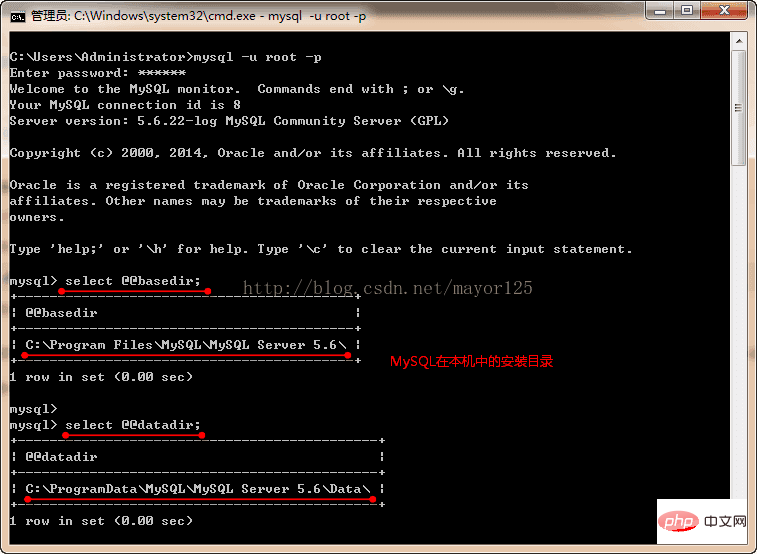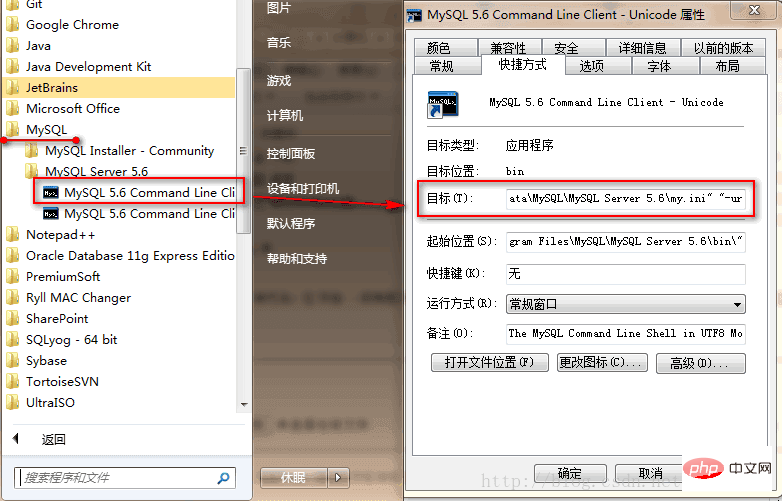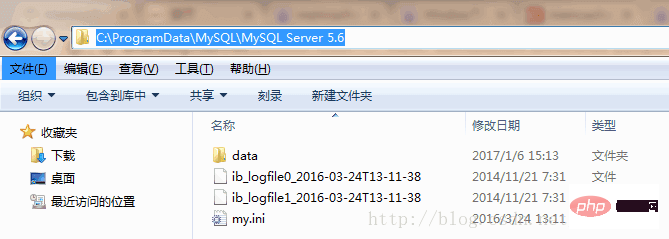How does mysql find the location of the configuration file my.ini?
This article will give you a detailed introduction to the method of mysql to find the location of the configuration file my.ini. It has certain reference value. Friends in need can refer to it. I hope it will be helpful to everyone.

A few days ago, I discovered a giant artificial intelligence learning website. It is easy to understand and humorous. I can’t help but share it with everyone. Click to jump to the tutorial.
Personal remarks: When the file type is not displayed, the my.ini file name is called my, and ini is displayed in the file attributes.
Find the my file and look at the properties to know whether it is my.ini
Problem description:
I will do a small experiment today and need to modify the MySQL configuration file. Install it on my computer The one is MySQL5.6. Since the installation took too long, I forgot which directory it was installed in, so I first checked the directory location of MySQL installed on this machine.
Log in to MySQL in the DOS command line window and enter the following command to view the MySQL installation directory and data storage directory. The MySQL configuration file is in the data storage directory:


Another method:
Find the MySQL command line client tool under "Start → All Programs → MySQL", right-click and select the command line tool to view " Properties", you can also see the location of the configuration file used by MySQL in "Target".

Note: The ProgramData directory may be "hidden". If it cannot be seen in the displayed partition, modify the system settings to make the hidden files/folders visible. Or you can directly copy the ProgramData/MySQL/MySQL Server 5.6 directory and paste it directly into the directory window of the folder.

---------------------------------- ----------------I am the divider-------------------------------- ----------------------------
The first step is to find the installation path of mysql on our computer and click on it. .
After entering in the second step, you can see that my.ini is in the root directory of the mysql installation path. This is one of the situations.
The third step is another situation where we cannot find it in the mysql installation directory and see the my-default.ini file. At this time, my.ini is in "C:\ProgramData\MySQL\MySQL Server 5.6" Under the directory, we first need to find the ProgramData folder. This is a hidden file. The hidden file needs to be visible or can be retrieved directly.
In the fourth step, we can see that the my.ini file is found under the "C:\ProgramData\MySQL\MySQL Server 5.6" directory.
Related recommendations: "mysql tutorial"
The above is the detailed content of How does mysql find the location of the configuration file my.ini?. For more information, please follow other related articles on the PHP Chinese website!

Hot AI Tools

Undresser.AI Undress
AI-powered app for creating realistic nude photos

AI Clothes Remover
Online AI tool for removing clothes from photos.

Undress AI Tool
Undress images for free

Clothoff.io
AI clothes remover

AI Hentai Generator
Generate AI Hentai for free.

Hot Article

Hot Tools

Notepad++7.3.1
Easy-to-use and free code editor

SublimeText3 Chinese version
Chinese version, very easy to use

Zend Studio 13.0.1
Powerful PHP integrated development environment

Dreamweaver CS6
Visual web development tools

SublimeText3 Mac version
God-level code editing software (SublimeText3)

Hot Topics
 1385
1385
 52
52
 Explain InnoDB Full-Text Search capabilities.
Apr 02, 2025 pm 06:09 PM
Explain InnoDB Full-Text Search capabilities.
Apr 02, 2025 pm 06:09 PM
InnoDB's full-text search capabilities are very powerful, which can significantly improve database query efficiency and ability to process large amounts of text data. 1) InnoDB implements full-text search through inverted indexing, supporting basic and advanced search queries. 2) Use MATCH and AGAINST keywords to search, support Boolean mode and phrase search. 3) Optimization methods include using word segmentation technology, periodic rebuilding of indexes and adjusting cache size to improve performance and accuracy.
 How do you alter a table in MySQL using the ALTER TABLE statement?
Mar 19, 2025 pm 03:51 PM
How do you alter a table in MySQL using the ALTER TABLE statement?
Mar 19, 2025 pm 03:51 PM
The article discusses using MySQL's ALTER TABLE statement to modify tables, including adding/dropping columns, renaming tables/columns, and changing column data types.
 When might a full table scan be faster than using an index in MySQL?
Apr 09, 2025 am 12:05 AM
When might a full table scan be faster than using an index in MySQL?
Apr 09, 2025 am 12:05 AM
Full table scanning may be faster in MySQL than using indexes. Specific cases include: 1) the data volume is small; 2) when the query returns a large amount of data; 3) when the index column is not highly selective; 4) when the complex query. By analyzing query plans, optimizing indexes, avoiding over-index and regularly maintaining tables, you can make the best choices in practical applications.
 Can I install mysql on Windows 7
Apr 08, 2025 pm 03:21 PM
Can I install mysql on Windows 7
Apr 08, 2025 pm 03:21 PM
Yes, MySQL can be installed on Windows 7, and although Microsoft has stopped supporting Windows 7, MySQL is still compatible with it. However, the following points should be noted during the installation process: Download the MySQL installer for Windows. Select the appropriate version of MySQL (community or enterprise). Select the appropriate installation directory and character set during the installation process. Set the root user password and keep it properly. Connect to the database for testing. Note the compatibility and security issues on Windows 7, and it is recommended to upgrade to a supported operating system.
 Difference between clustered index and non-clustered index (secondary index) in InnoDB.
Apr 02, 2025 pm 06:25 PM
Difference between clustered index and non-clustered index (secondary index) in InnoDB.
Apr 02, 2025 pm 06:25 PM
The difference between clustered index and non-clustered index is: 1. Clustered index stores data rows in the index structure, which is suitable for querying by primary key and range. 2. The non-clustered index stores index key values and pointers to data rows, and is suitable for non-primary key column queries.
 What are some popular MySQL GUI tools (e.g., MySQL Workbench, phpMyAdmin)?
Mar 21, 2025 pm 06:28 PM
What are some popular MySQL GUI tools (e.g., MySQL Workbench, phpMyAdmin)?
Mar 21, 2025 pm 06:28 PM
Article discusses popular MySQL GUI tools like MySQL Workbench and phpMyAdmin, comparing their features and suitability for beginners and advanced users.[159 characters]
 How do you handle large datasets in MySQL?
Mar 21, 2025 pm 12:15 PM
How do you handle large datasets in MySQL?
Mar 21, 2025 pm 12:15 PM
Article discusses strategies for handling large datasets in MySQL, including partitioning, sharding, indexing, and query optimization.
 How do you drop a table in MySQL using the DROP TABLE statement?
Mar 19, 2025 pm 03:52 PM
How do you drop a table in MySQL using the DROP TABLE statement?
Mar 19, 2025 pm 03:52 PM
The article discusses dropping tables in MySQL using the DROP TABLE statement, emphasizing precautions and risks. It highlights that the action is irreversible without backups, detailing recovery methods and potential production environment hazards.




